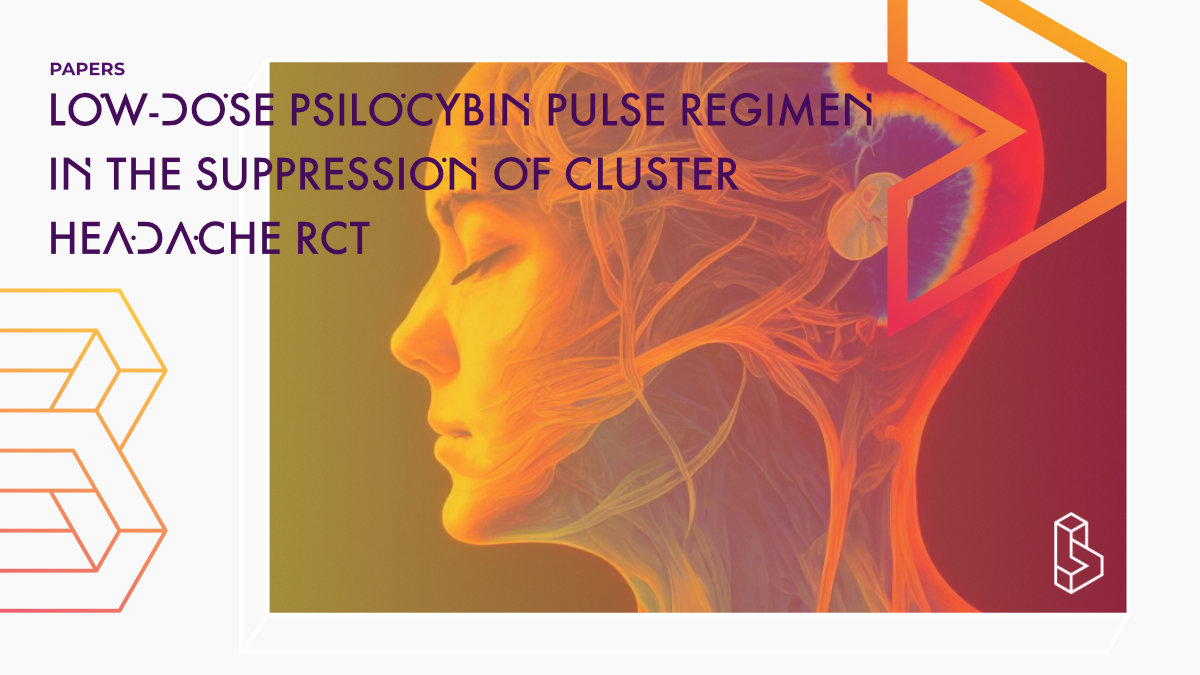This double-blind placebo-controlled study (n=14) finds that psilocybin (10mg/70kg, 3x) reduced the frequency of cluster headaches by 3 (from a baseline of 10), but this effect was not significant. The intensity of the acute experience didn’t impact the outcome. A study with more participants might find a significant treatment effect.
Abstract
“Objective Using a patient-informed regimen, we conducted an exploratory randomized, double-blind, placebo-controlled study to systematically investigate the effects of psilocybin in cluster headache.
Background Sustained reductions in cluster headache burden after limited quantities of psilocybin-containing mushrooms are anecdotally reported, although to date there are no controlled studies investigating these effects.
Methods Participants were randomized to receive psilocybin (0.143 mg/kg) or placebo (microcrystalline cellulose) in a pulse of three doses, each ~5 days apart. Participants maintained headache diaries starting 2 weeks before and continuing through 8 weeks after the first drug session. A total of 16 participants were randomized to receive experimental drug and 14 were included in the final analysis.
Results In the 3 weeks after the start of the pulse regimen, the change in cluster attack frequency was 0.03 (95% confidence interval [CI] −2.6 to 2.6) attacks/week with placebo (baseline 8.9 [95% CI 3.8 to 14.0]) and −3.2 (95% CI −8.3 to 1.9) attacks/week with psilocybin (baseline 9.6 [95% CI 5.6 to 13.6]; p = 0.251). Group difference in change from baseline had a moderate effect size (d = 0.69). The effect size was small in episodic participants (d = 0.35) but large in chronic participants (d = 1.25), which remained over the entire 8-week period measured (d = 0.81). Changes in cluster attack frequency were not correlated with the intensity of acute psychotropic effects during psilocybin administration. Psilocybin was well-tolerated without any unexpected or serious adverse events.
Conclusions Findings from this initial, exploratory study provide valuable information for the development of larger, more definitive studies. Efficacy outcomes were negative, owing in part to the small number of participants. The separation of acute psychotropic effects and lasting therapeutic effects underscores the need for further investigation into the mechanism(s) of action of psilocybin in headache disorders.“
Authors: Emmanuelle A. D. Schindler, R. Andrew Sewell, Christopher H. Gottschalk, Christina Luddy, L. Taylor Flynn, Yutong Zhu, Hayley Lindsey, Brian P. Pittman, Nicholas V. Cozzi & Deepak C. D’Souza
Summary of Exploratory investigation of a patient-informed low-dose psilocybin pulse regimen in the suppression of cluster headache
Cluster headache is a relatively rare headache disorder characterized by distinctive autonomic, circadian, and circannual features. Psychedelic compounds have been reported to produce lasting reductions in headache burden after a single or a few doses, suggesting a mechanism of action independent from these namesake effects.
A low dose of psilocybin taken three times, 5 days apart each, was found to be effective in suppressing several measures of cluster headache burden and was safe when administered under experimental conditions.
Study details
Compounds studied
Psilocybin
Topics studied
Headache Disorders
Study characteristics
Original
Placebo-Controlled
Double-Blind
Randomized
Participants
14
Humans
Institutes
Institutes associated with this publication
Yale UniversityThe Yale Psychedelic Science Group was established in 2016.
Compound Details
The psychedelics given at which dose and how many times
Psilocybin 10 mg | 3xLinked Research Papers
Notable research papers that build on or are influenced by this paper
Psilocybin pulse regimen reduces cluster headache attack frequency in the blinded extension phase of a randomized controlled trialThis double-blind, placebo-controlled study (n=10) assesses the safety and efficacy of repeated pulse administration of psilocybin (10mg/70kg, 3x in 15 days) in cluster headache patients. Following the initial trial, eligible participants received a psilocybin pulse at least 6 months later and kept headache diaries for 8 weeks. Results indicate a significant reduction in cluster attack frequency following the psilocybin pulse, suggesting potential therapeutic benefits.
Exploratory Controlled Study of the Migraine-Suppressing Effects of Psilocybin
This double-blind, placebo-controlled, cross-over study (n=10) finds that a medium dose of psilocybin (10mg/70kg) significantly reduced migraines (headaches) in the two weeks after dosing.
Linked Clinical Trial
Psilocybin for the Treatment of Cluster HeadacheThe purpose of this study is to investigate the effects of an oral psilocybin pulse regimen in cluster headache. Subjects will be randomized to receive oral placebo, low dose psilocybin, or high dose psilocybin in three experimental sessions, each separated by 5 days.

